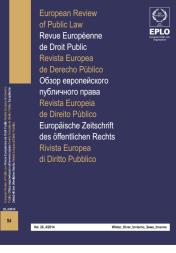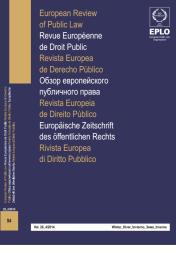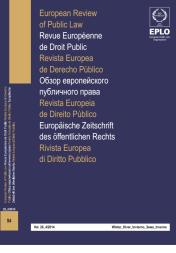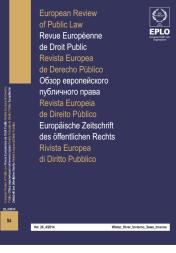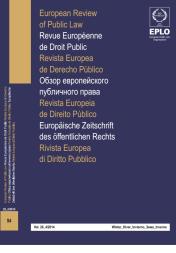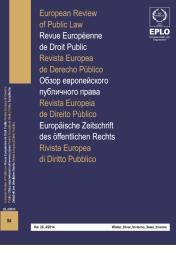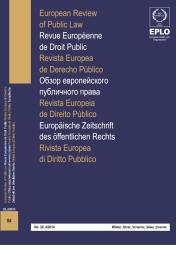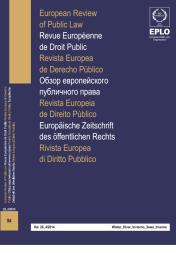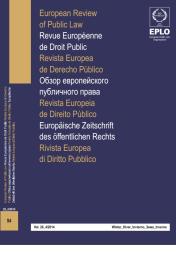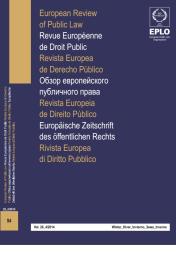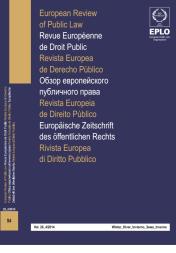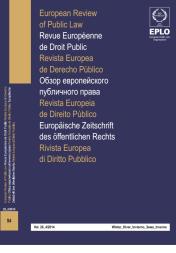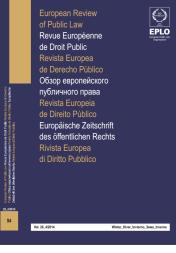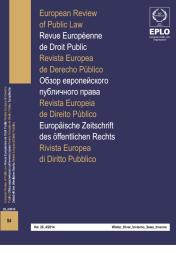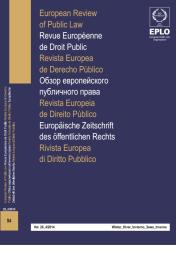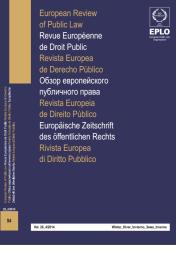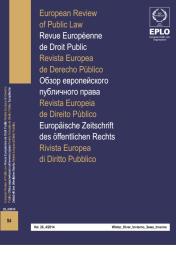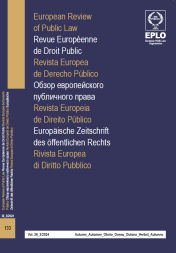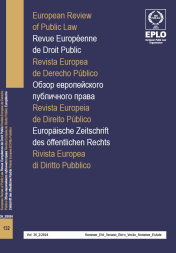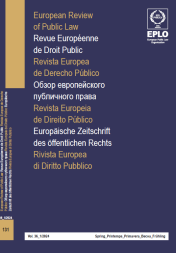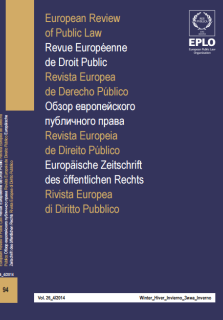
ERPL, vol. 26, no 4, autumn 2014 (94)
This ERPL issue starts by the speech presented by José Manuel Sérvulo Correia, Professor Emeritus at the Faculty of Law of the University of Lisbon, on the occasion of the ceremony of attribution to Professor Sérvulo Correia of the title of Doctor honoris causa of the National and Capodistrian University of Athens.
In the section of articles, there are five articles treating topical public law issues. The first study describes the current role of the European Court of Auditors in the context of audit on public finances of the States and of the European legal system. The connections between the ECA and the national Supreme Audit Institutions in the light of the Contact Committee's Intervention and the extension of the role of the ECA in the framework of the economic and financial crisis are particularly examined. The second article analyzes the problem of conflicts between national res judicata and an external body of rules (at international or supranational level, within the EU and ECHR systems), focusing more in particular on the different approaches to the solution that are connected to the principles recognizing Member States' procedural autonomy (EU system) and margin of appreciation (ECHR system) and on the similar consequences in terms of the role of the judiciary in the harmonizing process. The principle of institutional balance is examined in the third article in this ERPL issue, which maintains that this principle which has been used by the Court of Justice since the beginning of the European construction, could be used in a more systematic way as it is a key to understanding the institutional system of the Union and its evolutions and it can apply to all new issues originating from the Lisbon Treaty, such as the delimitation between legislative acts, delegated acts and implementing acts. The fourth article provides an evaluation of the legislation, case law and the aftermath of duress that vulnerable asylum applicants experience until their stay has been regularized. The relevant policy in the UK, focusing more on minors, is examined in this article. Last but not least, the final article in this ERPL issue analyzes the basic features of the fundamental rights system of the Greek legal order from four diverse and yet interconnected standpoints: in the framework of the Greek constitutional history; from the standpoint of the influence of International Law, the ECHR and European Union Law; through the presentation of the functions and legal sources for the protection of fundamental rights along with a case study of the mostly litigated in Greece constitutional rights; and the consideration of the system of judicial review in Greece as a guarantor for the application of constitutional and human rights.
In the section of chronicles on Constitutional Law, the chronicle coming from Germany examines the question of how opposition rights can be secured, starting from the fact that a new federal government, based on a coalition of the two major groups in Parliament, came into power at the end of 2013.
Another chronicle reflects on the Greek legislation on elections to the European Parliament, taking up the occasion of the passing of Law 4255/2014 which introduced preferential voting. This rather modest change had a profound effect on voters and revitalized interest in the EP and the selection of its members.
The following chronicle analyzes in two parts important decisions of the Latvian Constitutional Court in 2013. In the first part, the content of the challenged norms is analyzed (constitutionality of the system for verifying the legislative initiative of the people, knowledge of the Latvian languages by members of local government etc.) whereas in the second part the author focuses on locus standi issues developed in the court practice, such as the concept of real and effective legal remedies, the term for submitting a constitutional complaint etc.
In the following chronicle on Constitutional Law, the relevant developments in Poland during the year 2013 are examined. Stability of Polish constitutional law and constitutional practice characterizes this period which includes the adoption of an Act on procedure concerning persons with psychological troubles who pose a threat to life, health or sexual freedom of other persons as well as modification to the Act on the Minister of Defense. Other such developments as well as important judgments of the Constitutional Court are treated in this chronicle.
Next, the chronicle on Serbian constitutional law attempts to shed light on a decision of the Serbian Constitutional Court on the constitutionality of the Law on national councils of national minorities, which invalidated several provisions of the Law finding them unconstitutional.
The Spanish chronicle of Constitutional Law maintains that, since the year 2013 has been again a period of economic recession, almost all the legislative activity carried out by the public authorities has been enacted to counteract the impact of the economic crisis on Spanish society and economy. It focuses on fourt acts of great import; those on Transparency, Access to Public Information and Good Governance; on the Reform of the General Council of the Judiciary; on the Rationalization and Sustainability of Local Government; and on the Regulation of Bullfighting.
Next, in the section of Administrative Law, a chronicle coming from Germany maintains that once more the Federal Administrative Court of Germany was engaged in dealing with various aspects not only of the general but also of the specific parts of the German administrative law (litigations concerning the legal status of civil servants, 'requirement of consideration', area of school laws and partially connected law of religions, law of data protection and assemblies).
The next chronicle comes from Finland, where many major legislative projects have been left to the end of the electoral period. Developments in the field of administrative law, such as the submission of Government's proposal for the new Local Government Act, the definition of Sámi, the modification of the legislation on education or a major administrative judicial reform intended to reduce the Supreme Administrative Court's caseload, are examined.
The chronicle on Latvian Administrative Law presents important cases of the Department of Administrative Cases of the Supreme Court of Latvia in 2013 and in this context gives an overview of the ruling on why the communist ideology in Latvia and its historically specific political context cannot be protected as well as of two rulings on the use of the public domain in connection with taxi services. Finally the ruling on locus standi to bring an action for reducing noise pollution from highways is examined.
Next in this section, the author of the Polish chronicle on Constitutional Law presents the conclusions of the Annual Conference of the Public Administration Education Association of 2013 on the problem of the internationalization of the activities of public administration, the judicial and extrajudicial standards for the protection of individuals against the actions of the administration, local government etc. Moreover, judgments of the Constitutional Tribunal and of the Supreme Administrative Court for the protection of individual rights as well as significant changes in Polish Administrative Law are presented.
Amendments on public procurement, reform of the civil procedural law and adoption of a judicial admnistrative code are presented in the chronicle on Slovak Administrative Law. The reform of the State administration structure, called ESO (effective system of administration) is also examined in this chronicle.
Finally, the chronicle on Spanish Administrative Law confirms that once more an important number of laws in Spain have been influenced by the current situation of economic crisis and focuses on three laws: on rationalisation of the public sector and other measures of administrative reform, on action and foreign offices of the State and on telecommunications.
This ERPL issue is concluded by the Book Reviews Section as well as by an Analytical Table of Contents of the four ERPL issues of the year 2014.
Overall, this is an issue of the ERPL where, as is the standard pursued by the Review, many topical issues are discussed and a multinational overview of developments in the Constitutional and the Administrative Law of several countries is given.
SUMMARY / SOMMAIRE
ATTRIBUTION OF THE TITLE OF DOCTOR HONORIS CAUSA
OF THE NATIONAL AND CAPODISTRIAN UNIVERSITY OF ATHENS /
ATTRIBUTION DU TITRE DE DOCTEUR HONORIS CAUSA
DE L'UNIVERSITÉ NATIONALE ET CAPODISTRIENNE D'ATHÈNES
J. M. SÉRVULO CORREIA, Ceremony of Attribution of the Title of Doctor honoris causa [IN FRENCH]
ARTICLES
D. SICLARI, The New Functional Perspectives of the European Court of Auditors [IN ENGLISH]
F. GUELLA, National Rules on res judicata and European Law [IN ENGLISH]
F. LE BOT, The Principle of Institutional Balance in EU Law [IN FRENCH]
Z. AKHTAR, Asylum, Minors and Breaches of the Refugee Convention [IN ENGLISH]
C. M. AKRIVOPOULOU, Constitutional and Human Rights in Greece: A Short Account of Their Origins and Development in the Greek Legal System [IN ENGLISH]
CHRONICLES / CHRONIQUES
I. Constitutional Law / Droit constitutionnel
TH. GROSS, Federal Republic of Germany / République Fédérale d'Allemagne [IN GERMAN]
A. I. POTTAKIS, Greece / Grèce [IN ENGLISH]
A. RODIŅA, Republic of Latvia / République de Lettonie [IN ENGLISH]
K. WOJTYCZEK, Poland / Pologne [IN ENGLISH]
J. JERINIĆ / I. VILA, Serbia / Serbie [IN ENGLISH]
F. M. GARCÍA COSTA, Spain / Espagne [IN SPANISH]
II. Administrative Law / Droit administratif
M. BRENNER, Federal Republic of Germany / République Fédérale d'Allemagne [IN GERMAN]
K. KUUSIKKO, Finland / Finlande [IN ENGLISH]
J. BRIEDE, Republic of Latvia / République de Lettonie [IN ENGLISH]
J. CZLOWIEKOWSKA, Poland / Pologne [IN FRENCH]
L. MOKRA, Slovakia / Slovaquie [IN ENGLISH]
A. VILLANUEVA CUEVAS, Spain / Espagne [IN SPANISH]
BOOK REVIEWS / NOTES BIBLIOGRAPHIQUES
H. SYNODINOS [IN ENGLISH] FREE DOWNLOAD















